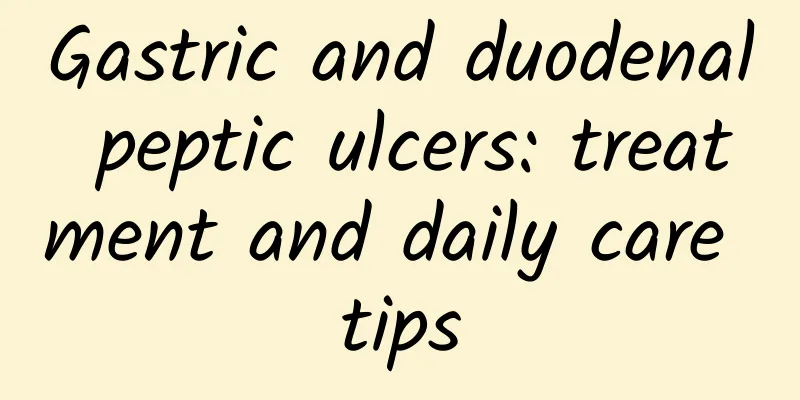Gastric and duodenal peptic ulcers: treatment and daily care tips

|
Author: Li Junxiang, Chief Physician, Oriental Hospital, Beijing University of Chinese Medicine Reviewer: Yang Yunsheng, Chief Physician, PLA General Hospital In the fast-paced modern life, gastric and duodenal peptic ulcers are common diseases that trouble many people. It not only affects the quality of our diet, but may also cause a series of serious complications. Understanding the correct treatment methods and precautions in daily life is essential to prevent recurrence and promote recovery. 1. Treatment methods and precautions The treatment of gastric and duodenal peptic ulcers mainly includes two methods: drug therapy and surgical treatment. Drug therapy is currently the most commonly used method, including mucosal repair agents, proton pump inhibitors, H2 receptor antagonists and mucosal protectants. Among them, mucosal repair agents and potassium ion competitive acid blockers can promote ulcer healing; proton pump inhibitors such as omeprazole can effectively inhibit gastric acid secretion and help the healing of ulcer surfaces; although H2 receptor antagonists are slightly less effective than proton pump inhibitors, they can still be used as auxiliary treatments in some cases; mucosal protectants protect the gastric mucosa. For patients with symptoms such as bloating and hiccups, gastrokinetic drugs can also be used to improve symptoms. Helicobacter pylori infection is one of the main causes of gastric and duodenal peptic ulcers. Data show that about 80% of gastric ulcer patients and 95% of duodenal ulcer patients are infected with Helicobacter pylori. Therefore, for patients with gastric and duodenal peptic ulcers with Helicobacter pylori infection, eradication of Helicobacter pylori is crucial. For patients with concurrent Helicobacter pylori infection, eradication therapy is required. The eradication regimen usually adopts "triple therapy" or "quadruple therapy", including a proton pump inhibitor (or potassium ion competitive acid blocker), a bismuth agent and two antibiotics (such as amoxicillin and clarithromycin). The treatment cycle is usually 10 to 14 days, during which most patients can successfully eliminate Helicobacter pylori. However, since the use of antibiotics may cause side effects such as bitter taste and diarrhea in patients, patient compliance is very important. Figure 1 Original copyright image, no permission to reprint When drug treatment is ineffective, further differential diagnosis is required; in cases of massive bleeding, perforation, obstruction, etc., endoscopic examination or surgical treatment needs to be considered. 2. Precautions in daily life In daily life, patients with gastric and duodenal peptic ulcers should pay special attention to diet management. Eat regularly and in fixed amounts, avoid spicy, greasy, raw and cold foods, and reduce the intake of irritating drinks such as coffee and strong tea. In addition, excessive sweets should be avoided because they promote gastric acid secretion. It is recommended to eat more foods rich in vitamins, such as fresh vegetables and fruits, and mainly soft foods, such as porridge and noodles, to reduce irritation to the gastric mucosa. Maintain a good mental state and avoid being in a state of tension or depression for a long time, because negative emotions will lead to increased gastric acid secretion, which will aggravate the condition. A positive attitude is conducive to the recovery of the disease. It is also necessary to quit smoking and limit alcohol consumption. Nicotine in tobacco can affect the function of the pyloric sphincter and promote bile reflux, thus aggravating ulcers. Alcohol can directly damage the gastric mucosa, so both should be avoided. At the same time, avoid long-term use of nonsteroidal anti-inflammatory drugs and hormone drugs, because these drugs can damage the gastric mucosal barrier and cause or aggravate ulcers. Figure 2 Original copyright image, no permission to reprint 3. Prevention of recurrence and early detection Although gastric and duodenal peptic ulcers can be cured, the risk of recurrence is still very high if you do not pay attention to your lifestyle. In addition to the precautions mentioned above, regular checkups are also required to ensure that Helicobacter pylori is completely eliminated. At the same time, if symptoms such as changes in pain patterns, poor treatment effects, weight loss, and continuous bleeding occur, you should be highly alert to the possibility of cancer and seek medical attention in a timely manner. |
<<: Gastric and duodenal ulcers: causes, diagnosis, and prevention
Recommend
Leucorrhea is a big yellow-green
Large yellow-green leucorrhea is generally a fact...
What are the dangers of low blood pressure in women?
The harm of long-term hypotension in women is ver...
Does eating instant noodles often affect the fetus during pregnancy?
In the early stages of pregnancy, many pregnant w...
Can women eat kiwi fruit during pregnancy?
During pregnancy, it is particularly beneficial t...
Ideals are full, but reality is skinny! Two tips to help you narrow the gap between ideals and reality
"What kind of person am I?" This is a q...
Is it appropriate for residents of the community to put disinfectant tablets into the sewers at the same time?
Recently, a piece of news spread on the Internet....
The road to recovery from appendicitis: practical nursing can help you!
Appendicitis is a common disease that has a great...
Ten days after the abortion, the bleeding is not painful
Women generally have to endure great pain during ...
Can postpartum women eat leeks?
In our country, pregnant women pay more attention...
Why does the iPhone get so hot? What should I do if the iPhone baseband is broken?
Mobile phones can be said to be a must-have elect...
Treatment of pharyngitis during lactation
During the breastfeeding period, pharyngitis may ...
Facial liver spots pictures
Everyone knows the pursuit of beauty. Many women ...
What are the steps for making spicy rice noodles at home? How to make spicy rice noodles with tofu
Rice noodles are a popular snack in the streets a...
How long can an egg survive?
The egg is a reproductive cell in the female body...
Why do I feel hungry easily during late pregnancy?
Many pregnant women have a poor appetite during p...









